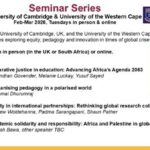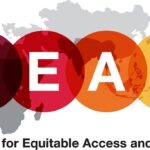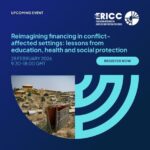 Knowledge, Power And Possibilities: Reimagining Education In Memory of Dr. Arif Naveed
Knowledge, Power And Possibilities: Reimagining Education In Memory of Dr. Arif Naveed
Sunday, 14 September (Online) and Monday, 15 September (In-Person at Department of Education, University of Oxford) Please note this will be held from 10am to 5pm on the day prior to the start of the UKFIET conference.
The deadline for proposal submission is 1 August 2025, 12 midnight (BST).
—–
- CALL FOR PARTICIPATION
Welcome to the 2025 BAICE Annual ECR Hybrid Conference entitled “Knowledge, Power, and Possibility: Rethinking Education in the Memory of Dr. Arif Naveed”. This year’s conference honours the memory of Dr. Arif Naveed, whose work on inequality, education mobility, and social justice in the Global South continues to inspire critical and transformative scholarship. In his spirit, we invite early career researchers to question dominant paradigms, explore alternative ways of knowing, and imagine more just educational futures.
Drawing on Dr. Naveed’s spirit and ideas, this conference blends conferencing, un-conferencing, and collective gathering with the aim of fostering bold, innovative, and thoughtful conversations. Dr. Naveed was a tireless advocate for emerging scholars. He founded the BAICE Student Committee, helped launch the Student Fieldwork Grant, and co-hosted the 2016 Student Conference, which saw the publication of the piece ‘Understanding, embracing and reflecting upon the messiness of doctoral fieldwork’ along with his colleagues, an idea conceived from the Compare Forum. To learn more about Dr. Naveed’s legacy, read this tribute by his colleague Peter Sutoris. Further reflections from the international education community can be found here.
All sub-themes are intentionally framed through a decolonial lens, signalling our belief that every topic in education can be rethought from ‘an-other’ perspective. Presenters are empowered to define their own sub-themes within the broader framework, allowing you to determine how your work best fits and contributes to these critical conversations.
We warmly invite innovative and creative submissions based on the following themes and beyond.
—–
- THEMES & SUB-THEMES
- Rethinking the Role of Researchers in Unequal Worlds
- Navigating unplanned disruptions in the field
- Researcher positionality, identity, and power
- Ethics beyond the consent form
- Emotional labour and researcher wellbeing
- Representing participants’ voices ethically and effectively
- Methodological adaptation and flexibility
- Writing and narrating the “messy middle”
- Grappling with Decoloniality: Reimagining Knowledge and Research in Service and Struggle
- Understanding how lived experiences and beliefs shape and reshape education experience and its expectations.
- What is a compassionate researcher?
- The intertwining between schooling and (social) structures
- The hidden or apparent barriers of participating in schooling and the education process
- Education and its promises of social mobility
- Habitus and the decolonial turn in education
- Ethics beyond the consent form
- Education in Global Contexts
- Understanding how lived experiences and beliefs shape and reshape education experience and its expectations.
- The hidden or apparent barriers of participating in schooling and the education process
- The intertwining between schooling and (social) structures
- Education and its promises of social mobility
- Navigating unplanned disruptions in the field
- The global diffusion of AI in education
- Methodological adaptation and flexibility
- (In)Equal Pathways: Education and Aspiration in the Global South
- What is a compassionate researcher?
- Representing participants’ voices ethically and effectively
- Emotional labour and researcher wellbeing
- Education and its promises of social mobility
- Aspirations, Embodied Habitus, and Structural Pathways
- The intertwining between schooling and (social) structures
- Writing and narrating the “messy middle”
- Other/Beyond these themes
- This section is for those who feel that they have something to offer that does not necessarily fit into one of the proposed themes.
- Please briefly explain how your proposal aligns with the conference’s spirit of “Knowledge, Power, and Possibility: Reimagining Education in the Memory of Dr. Arif Naveed.”
—–
- SUBMISSION FORMATS
To encourage diverse forms of engagement and knowledge sharing, we are offering the following submission formats:
Presentations
Here are the available options for your presentations:
- Traditional Format: Share your research findings in a traditional 10-minute presentation covering your introduction, methods, results, discussion, and impact.
- Informal Discussion: Engage in a 10-minute discussion of your research project summary. This format prioritizes dialogue, so PowerPoint presentations aren’t necessary.
- Storytelling Session: Narrate your project through a 10-minute storytelling session, primarily using visuals like pictures, postcards, or drawings.
- Poetry Presentation: Convey your project using poetry as a medium of expression.
All presentations will be followed by a 5-minute Q&A with the audience and can be conducted in both online and in-person formats.
Digital Posters
- Present your project’s introduction, methods, results, discussion, and impact through a digital poster.
- Each poster will have a total of 10 minutes allocated for display, your brief presentation, and audience Q&A.
- Digital posters are only available in the online format
Pecha Kucha
- Present your research in a concise and engaging format in 5-minute
- Emphasis is on visual images and graphics
- Pecha Kucha is available in both in-person and online format depending on number of submissions
The deadline for proposal submission is 1 August 2025, 12 midnight (GMT).
For any questions relating to the event, please email students@baice.ac.uk
—–
- SUBMISSION LINK
Please submit your 300-word proposal (excluding references) via this link: https://forms.gle/cv1FLHGgiRDZC2WV6 (if the link is not clickable, kindly copy-paste it to the address bar of your web browser)
BAICE Student Committee in collaboration with UKFIET Student Committee


![[Crisis Spotlight] Protecting the Right to Education in Sudan](https://www.ukfiet.org/wp-content/uploads/2026/01/Crisis-spotlight-17-2-26-150x150.jpg)


